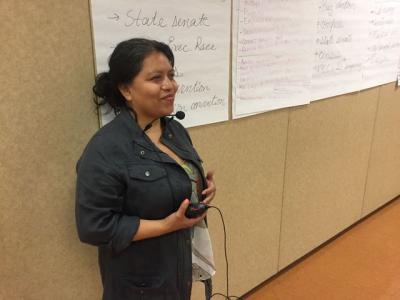
Some have found that interpretation is a natural part of their political work. That was the experience of Catalina Nieto, an immigrant from Colombia who started conducting bilingual meetings while doing immigrant rights organizing in Nashville, Tennessee. Two others, Maria Garcia and Telesh Lopez, volunteered with Domestic Workers United before starting a collective called Caracol Language Coop.
Tijerina, who interprets American Sign Language and Spanish, says he began to inject political ideas into his practice while working at Highlander Research and Education Center. “I didn’t change the mechanics on a basic level, but I gained a greater understanding of the role of the interpreter and the politics involved,” he says. He went on to develop an interpreting for social justice workshop that has helped shape the careers of many. Says alumnus Salem Acuña, “It made me think critically about the power dynamics that come with language access.”
Go to the GEO front page

Add new comment